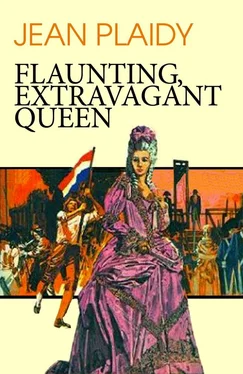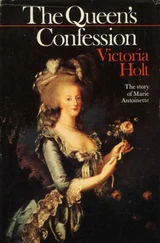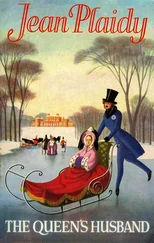Виктория Холт - Flaunting, Extravagant Queen
Здесь есть возможность читать онлайн «Виктория Холт - Flaunting, Extravagant Queen» весь текст электронной книги совершенно бесплатно (целиком полную версию без сокращений). В некоторых случаях можно слушать аудио, скачать через торрент в формате fb2 и присутствует краткое содержание. Жанр: Исторические любовные романы, на английском языке. Описание произведения, (предисловие) а так же отзывы посетителей доступны на портале библиотеки ЛибКат.
- Название:Flaunting, Extravagant Queen
- Автор:
- Жанр:
- Год:неизвестен
- ISBN:нет данных
- Рейтинг книги:5 / 5. Голосов: 1
-
Избранное:Добавить в избранное
- Отзывы:
-
Ваша оценка:
- 100
- 1
- 2
- 3
- 4
- 5
Flaunting, Extravagant Queen: краткое содержание, описание и аннотация
Предлагаем к чтению аннотацию, описание, краткое содержание или предисловие (зависит от того, что написал сам автор книги «Flaunting, Extravagant Queen»). Если вы не нашли необходимую информацию о книге — напишите в комментариях, мы постараемся отыскать её.
Flaunting, Extravagant Queen — читать онлайн бесплатно полную книгу (весь текст) целиком
Ниже представлен текст книги, разбитый по страницам. Система сохранения места последней прочитанной страницы, позволяет с удобством читать онлайн бесплатно книгу «Flaunting, Extravagant Queen», без необходимости каждый раз заново искать на чём Вы остановились. Поставьте закладку, и сможете в любой момент перейти на страницу, на которой закончили чтение.
Интервал:
Закладка:
So crowded were the gardens that it seemed as though all Paris had come to Versailles.
The people were delighted; they told each other that in the day of le Roi Soleil there had been many such pleasures. Those were the good old days. It might well be that when the old King died and the new King was on the throne with that perfectly enchanting young bride of his, there would be gaiety as there had been in the past.
That afternoon they began to long for the day when the Dauphin became King. Instead of ‘Dauphin Louis’ they began to call him ‘Louis le Désire’.
The early afternoon was warm and sunny; the scent of flowers filled the air and the fountains and waterfalls sparkled in the fresh May sunshine; but very soon the sky was overcast, and by three o’clock the first rain had fallen.
There were anxious looks at the sky.
‘It will soon clear,’ people told each other as they sheltered under the trees. But this was optimism, for soon the rain was falling in torrents and the trees could offer little shelter. Lightning flashed and thunder rolled.
A bad end to the wedding day, the people grumbled.
And it was soon obvious that there would be no firework display in the gardens of Versailles on that day.
Wet to the skin, sick with disappointment, the people began to leave the gardens. In the early evening the rain was still falling and the gardens of Versailles were deserted; the road back to Paris was crowded with carriages and people on foot.
But in the great salon the candles were lighted, the musicians were playing, and the royal family sat down to the banquet, watched in the galleries by the noblest in the land.
On the right-hand side of the King sat Antoinette, young enough to delight in the rich strange foods, young enough to be dazzled by splendour such as she had never seen before.
The King clearly showed his affection for her; the rest of the family seated round the table were eager to follow his example and let her know how welcome she was. Only her bridegroom seemed aloof, sitting silent on the other side of his grandfather.
She was very interested in the members of her new family. There were two brothers-in-law and two young sisters-in-law; there were her husband’s three aunts – Madame Adelaide, Madame Victoire and Madame Sophie.
Her brothers-in-law seemed to be watching her all the time. The elder of the two was fourteen years old; he was Louis Stanislas Xavier, Comte de Provence, a proud boy, who seemed a little resentful of his elder brother; the other brother was a boy of thirteen, Charles Philippe, Comte d’Artois; he was more artless than Provence and too delighted by the ceremony to show any envy. Clothilde, the elder of her sisters-in-law, was plump and rather plain; Elisabeth the younger was very quiet and prettier than her sister. As for the three aunts, they were terrifying, partly because they looked so prim, partly because they were so watchful. Antoinette felt that nothing she did could escape their sharp eyes.
There was one present whom Antoinette could not believe to be a member of the royal family. She was a boldly handsome woman with a loud and raucous laugh and an air of easy familiarity when she addressed the King. She was the Comtesse du Barry, and Antoinette could not understand why she – the only person not a member of the royal family – should be allowed to sit with them.
She found it difficult to hold back the question which rose to her lips, and once was on the point of asking the King in what way Madame du Barry was connected with the family.
It was only when she caught the eye of Madame Adelaide and the expression in that lady’s face showed such alarm that she stopped short; she realised then that the Dauphin was shifting uncomfortably in his chair, and that young Artois seemed to be smothering a fit of choking.
The King had tactfully turned to her and laid his hand over hers.
‘You must try this dish of quails, my dear … a French delicacy. We must teach you to understand our French … concoctions, must we not?’
So she tried the quails and declared them delicious.
Calm was restored to the table.
The banquet was over and night had fallen on the Palace of Versailles. Now had come that moment to which the Dauphin had looked forward with such dread.
The King placed the Dauphine on his right hand and the Dauphin on his left and led them to the bridal chamber.
It was a solemn ceremony – as solemn as that which had taken place in the Chapel of Louis Quatorze. The Archbishop of Rheims was blessing the bed, praying that it might be fruitful, as he sprinkled it with holy water.
The bride was flushed and eager; the bridegroom seemed sullen and indifferent.
Oh, my poor Berry! thought the King, as he handed his grandson his nightshirt, while the Duchesse de Chartres, as a married lady with royal connexions, handed Antoinette her nightgown.
Thus ready for that ordeal of which the bride was quite ignorant and the bridegroom terrified, they approached the bed; and in it they lay side by side – two children, the bride not quite fifteen, the bridegroom not yet sixteen – while the curtains of the bed were drawn about them.
The next day the Dauphin wrote in his diary one word: ‘ Rien .’
Chapter II
THE DAUPHINE AT VERSAILLES
It was not long before Antoinette realised that life at Versailles was not going to be very different from that in the Schönbrunn Palace, for her mother had sent strict instructions as to how her education was to be conducted; she had even sent the Abbé de Vermond, that her daughter might continue to study under him. She had written to the King of France to the effect that her daughter was very young and that marriage had interrupted her education; she wished her therefore to live as quietly as possible in her new home until she was mature enough to fit her new position with grace.
The King had readily agreed. He was too indolent to concern himself with the upbringing of his new granddaughter and quite prepared to let her mother continue with the responsibility.
What Maria Theresa did not realise was that, although it was a comparatively easy matter to keep her daughter childish in her own Court, in the brilliant one at Versailles – where amours were the order of the day and the reflection of all that wit and brilliance which had graced the Court of Le Roi Soleil still lingered – the young girl was bound to find the life planned for her irksome.
There was intrigue all about her.
She quickly discovered this when, on the morning after her wedding night, she was visited by the three aunts, ‘Les Mesdames’ as they were called throughout the Court.
Madame Adelaide, the eldest of the three unmarried daughters of Louis Quinze, was clearly the most dominant; Madame Victoire was kind but neurotic and apt to panic at the slightest difficulty; Madame Sophie was the ugliest of the three and, being constantly aware of this, was very shy. The two younger sisters were very much under the influence of the eldest, and the three were more often than not in each other’s company. The whole Court, following the King’s example, was inclined to treat them with ridicule. They were Princesses for whom husbands had not been found; they were middle-aged and far from prepossessing; and they had been foolish enough to band themselves together against the King’s mistresses. They should have known better, and suffered accordingly.
They were pious and disapproving, and Adelaide, unable to stop herself meddling in Court intrigue, carried her sisters along with her.
Madame Adelaide had deeply resented the Austrian marriage and was determined to hate Antoinette. But, as she told her sisters, ‘This we must hide, for through the child we may discover a great deal.’
Читать дальшеИнтервал:
Закладка:
Похожие книги на «Flaunting, Extravagant Queen»
Представляем Вашему вниманию похожие книги на «Flaunting, Extravagant Queen» списком для выбора. Мы отобрали схожую по названию и смыслу литературу в надежде предоставить читателям больше вариантов отыскать новые, интересные, ещё непрочитанные произведения.
Обсуждение, отзывы о книге «Flaunting, Extravagant Queen» и просто собственные мнения читателей. Оставьте ваши комментарии, напишите, что Вы думаете о произведении, его смысле или главных героях. Укажите что конкретно понравилось, а что нет, и почему Вы так считаете.











